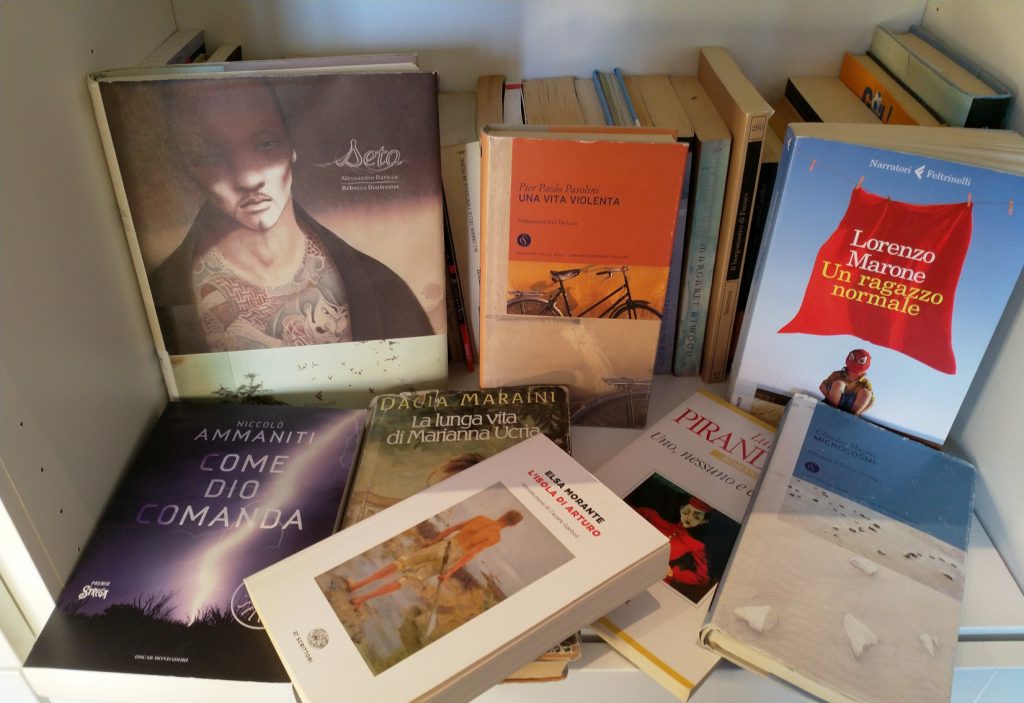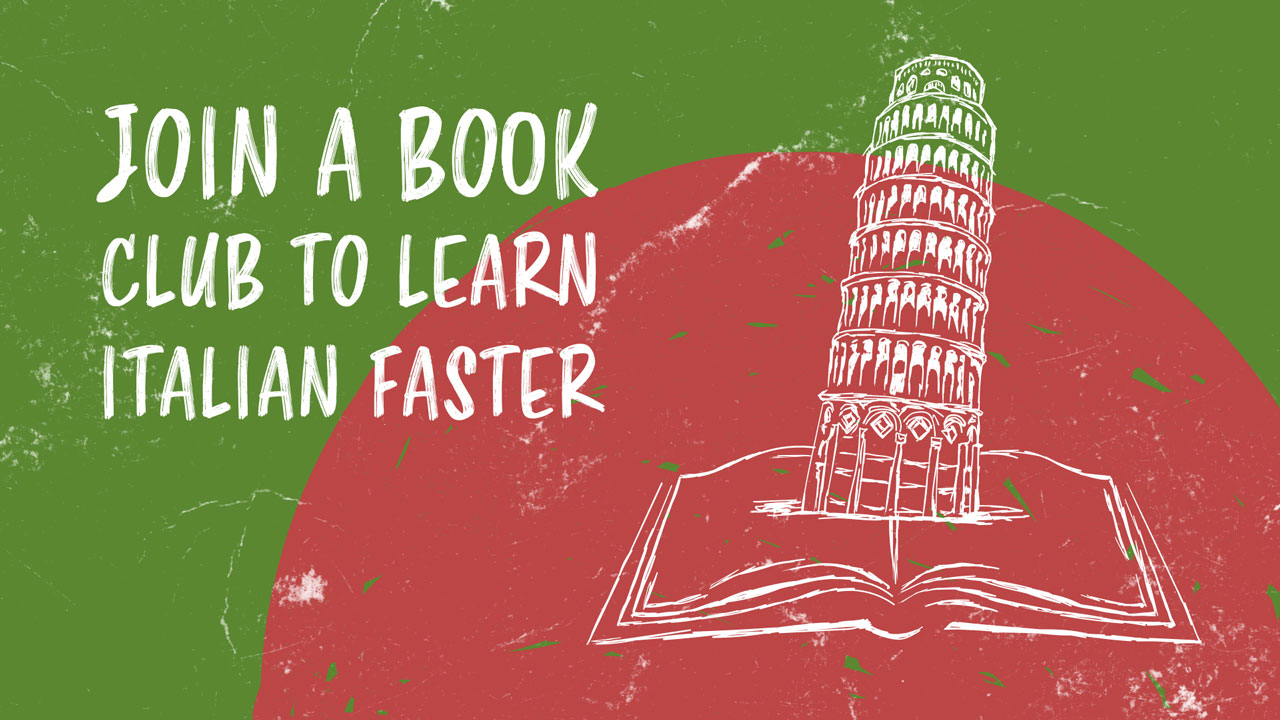How Joining a Book Club Will Help You Learn Italian Fast
Are you stuck in your Italian learning? Perhaps you’re at a plateau and cannot get past it? You have tried everything and are starting to lose your motivation.
Well, reading is one way to get unstuck, learn quicker, and discover more than the language. Joining a book club might be just what you need.
If you want to know:
- How reading can help you recharge your motivation to learn your target language
- Why reading is important for language learning
- What techniques to use to read in a foreign language
- Why you should join a book club and how to choose one
Then this is the right post for you.
Why I Believe in the Power of Book Clubs for Learning a Language
I am a teacher and teacher trainer of Italian as a second language, and I have over fifteen years of experience in teaching this beautiful language. Two of my interests are language acquisition and reading.
During my career, I have been teaching adults, mostly in group settings, and training teachers. I founded my own Italian school, which operates entirely online and offers a book club.
I believe that reading in a foreign language, and especially from native authors, greatly increases your chance of truly learning.
I learned English as an adult and reading has been a key to genuinely appreciate and grasp all the intricacies of the language and its beauty. So let’s see how reading can help you.
Why Reading for a Book Club Can Help You Get Your Motivation Back
If you have lost your motivation for learning your target language, is it because you no longer see any improvements in your language learning? Or you might feel like you are forgetting words rather than acquiring new ones?
What you need is a motivation boost, which you can get by reading in a book club setting.
It goes without saying that reading something that you like gives you pleasure. You might also like the idea and satisfaction of reading texts that are meant for native speakers.
If, for example, you like a thriller, you might carry on with the task, even if it becomes difficult because you wish to know how the story ends.
Being part of a book club gives you further motivation as all members wish to contribute insightfully to the discussion, and will work harder to be able to do so.
But there is more to reading than boosting your motivation.
Context and Storytelling Help You Learn Vocabulary With a More Lasting Effect
If you have been trying to learn Italian by memorising random lists of words, you might know by now that this does not work well.
Our brain and our memory function through connections and pathways. A list of words without connection to each other will soon be forgotten.
If you wish to store a new word in your memory, it is more beneficial to ‘anchor’ it to something already there. This is because our brain has evolved to retain only information that is meaningful.
Context and stories do not only make vocabulary memorable, but they also have the power of contributing meaning to a word, even a new word that you have never come across before.
Storytelling is the natural human way to pass on information and experiences. This is why it is so powerful as a means for learning a language.
Why Is Reading in Italian so Difficult?
If reading in a foreign language is a natural way to learn it, why does it seem so difficult?
If you have already tried reading in Italian, but have found it really hard, there are a few ways to explain it. Perhaps you have chosen a book that is still too difficult for your current level of Italian. Or it might just be that you don’t yet know the correct techniques for reading.
Let me help you with that.
Authentic Material vs Graded Texts
You can read in a foreign language at any level. However, if you are a beginner or lower intermediate student, you might want to start with graded texts.
These are not texts meant for Italians. They have been prepared for students and are simplified according to different language levels.
These texts are usually based on a number of words. If you are a beginner, you might choose 500 words. If you are an intermediate, go up to 1,500.
Authentic material such as novels and short stories written for native speakers are more appropriate for upper intermediate and advanced students.
Even if you can read at a more advanced level, it’s still important to use the right strategy. Here is my tried and true technique:
5 Steps for Reading Any Texts in a Foreign Language
After using your graded texts for a while, you might want to graduate to the real thing, i.e. books that are meant for natives.
Here are 5 steps that might help you build up your confidence when reading texts in a foreign language.
1. Use the Context to Get Some Idea of What You Are Reading
Before you read, try to understand what you can from the title, images, and genre of the book.
These elements will tell you a lot about what to expect from the text. They will give you vital clues for understanding more when you begin to read.
2. Read the Entire Text Once to Get the General Meaning
A big mistake that all my students make when reading a book is to want to know every single word on their first read.
However, this is an exhausting expectative which ends in frustration and ultimately in abandoning the task altogether.
When you read, choose the length of your text wisely to not get discouraged.
For example, if you are reading a novel, your goal can be to read one chapter. If you are reading the first chapter, which is 30 pages long, work on half of it. Then read the entirety of the chosen text from beginning to the end.
Do not worry about missing out on meaning, just read. Read as if you are soaking in the words, as if you wish to get the ‘feeling’ of them rather than the whole meaning.
3. Think About the Text You Have Read and Ask Yourself “What Do I Understand?”
Don’t worry if the ideas are still sketchy. Your mind is already at work even if you don’t feel this way.
Try to put the meaning of the text together, thinking of some key words you have found in the text.
Also, try to think logically: if something happens, what usually follows this type of action?
4. Read Once More and Underline Words You Don’t Understand
Be very economical with the number of words you feel you don’t understand. Not all words have the same importance.
For example, in a chapter, you might only need to underline 5-8 words, but you would still be able to get a lot of the meaning.
Underline the words but do not look them up yet, read the text again till the end.
5. Use the Dictionary
Now, it is time to use the dictionary to look up the underlined words. After this, you might wish to read the entire passage again.
By looking up only a few important and memorable words, these will become an inevitable part of your new vocabulary arsenal.
Why to Join an Italian Book Club
As we discussed earlier, joining a book club can be extremely helpful to your motivation.
Sharing the experience with other readers increases your enthusiasm and gives you more learning options! You can learn from your peers, as well as from the teacher, if one is running the club.
As you are accountable to the club, you are less likely to abandon the task.
Additionally, a book club allows for discovering new authors you didn’t know before, as a book club in Italian will feature books by Italian authors.
Reading short stories and novels by Italian authors will be more meaningful for learning the language. Language is deeply entwined with the culture and learning about the culture will deepen your understanding of the language itself in return.
What to Expect From a Book Club and What Questions to Ask
A good book club should welcome you and make you feel comfortable.
If you can choose one moderated by a native teacher, they can deepen your cultural understanding as well as the understanding of the meaning of the text itself.
During the session, you and your fellow readers will discuss the story as a whole, the characters, and also specific elements that each has picked up in their reading.
These elements might be about items of language, such as new words or phrases, or even about entire passages that are considered particularly evocative or beautifully written.
If you have never joined a book club before, it might be daunting to join one in a foreign language. To get the best outcome, ask these questions before you join:
- What level is expected from the participants?
- How long do you have to read the set text?
- Will the text be broken down into chapters, or do you need to read the entire book?
How to Prepare Before a Book Club Session to Make the Most Out of It
Before you start reading, do a bit of research about the author and the book. Get some clues from the book itself, its genre, the pictures on the cover or inside.
Start reading by applying the techniques mentioned above. Use your dictionary sparingly and always for words you feel are truly important.
If you own the book, underline passages that help with understanding the characters. Other important passages are related to the explanation of main events. Others might be beautiful and poetic passages that you wish to remember.
Take notes about items that you wish to bring up in discussions and even questions about which you wish to understand more of.
A Few Tips to Find a Book Club in a Foreign Language
There are various ways to find a book club in Italian. Here are some examples:
- Visit a book shop specialising in Italian language books and ask.
- Use Meetup. Register on the platform and then just search. As this is a large platform and groups will be plentiful, there is no guarantee that you will find a serious group straight away. However, try a few and see if you find what you are looking for.
- Use Facebook, Twitter or Instagram. Search for pages and accounts specialising in Italian as a foreign language by searching ‘learn Italian’. Ask them, too.
- Of course, you can join Parla Italiano’s book club, my book club!
We read the usual authors, such as Ferrante and Calvino, but we also offer less known and equally interesting authors such as Lorenzo Marone, Alessandro Baricco and Claudio Magris.
We don’t read the entire book but the sessions each focus on a specific chapter. We find that this is less daunting for students, it gives them a taste of the author and if they do not like it, they are not stuck with it.
On the other hand, if they fall in love with the author, they can then read the full book by themselves or request more chapters be added to the club programme.

To Sum It Up
Reading is a natural way of learning Italian.
There are certain techniques that can be helpful to get the most out of the experience. In summary, remember:
- Reading does not mean understanding every word the first time around (nor the second).
- Use your dictionary sparingly only to look up the most meaningful words.
- Every time you read the text again you will add to your understanding. After every read, summarise what you understand.
- Join a supportive and welcoming book club.
- Read Italian authors in Italian. This will add the cultural dimension to your experience, which is essential to understanding the language at a deeper level.




Social